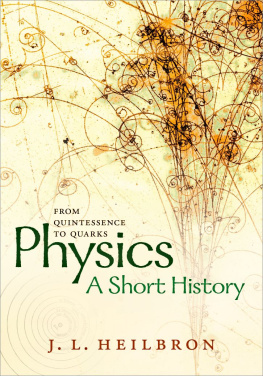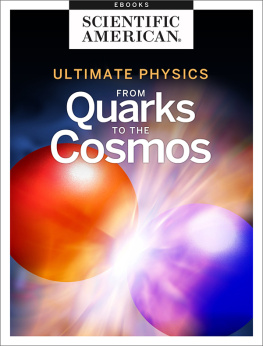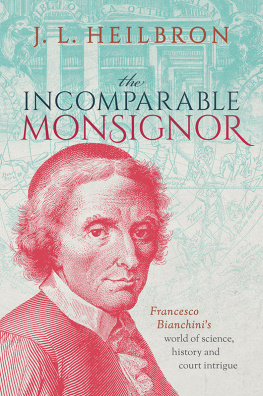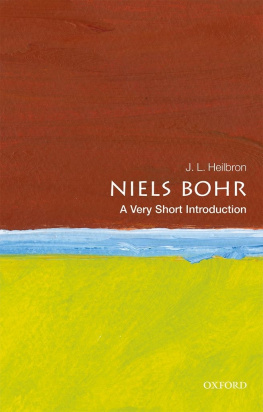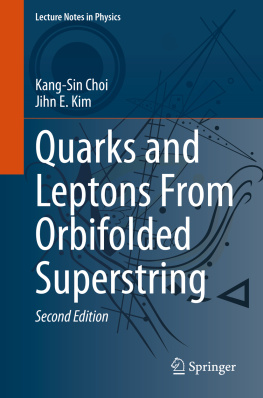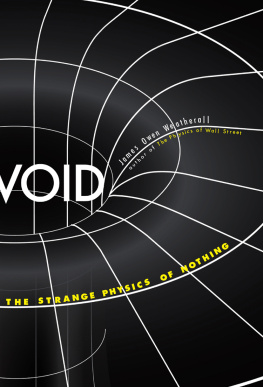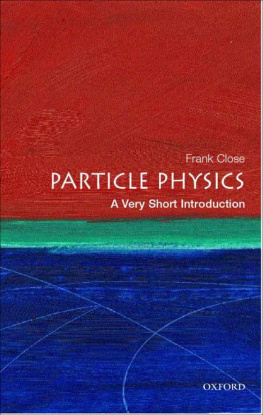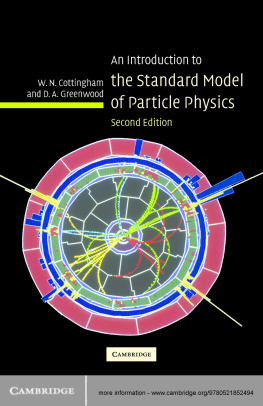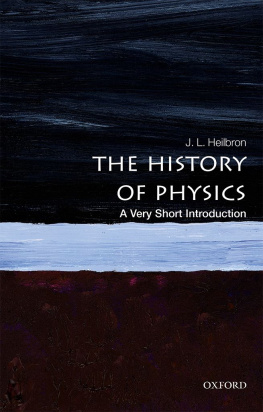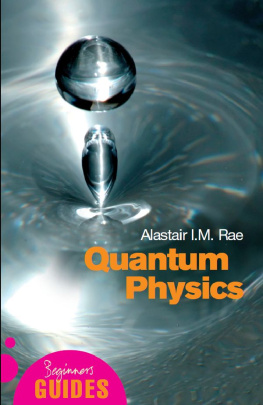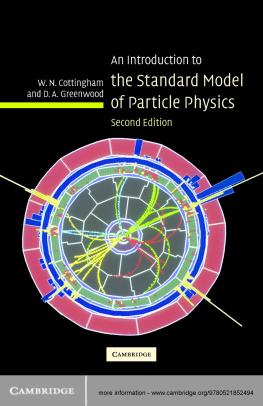Heilbron - Physics: a Short History from Quintessence to Quarks
Here you can read online Heilbron - Physics: a Short History from Quintessence to Quarks full text of the book (entire story) in english for free. Download pdf and epub, get meaning, cover and reviews about this ebook. City: Oxford, year: 2016;2015, publisher: Oxford University Press, genre: Religion. Description of the work, (preface) as well as reviews are available. Best literature library LitArk.com created for fans of good reading and offers a wide selection of genres:
Romance novel
Science fiction
Adventure
Detective
Science
History
Home and family
Prose
Art
Politics
Computer
Non-fiction
Religion
Business
Children
Humor
Choose a favorite category and find really read worthwhile books. Enjoy immersion in the world of imagination, feel the emotions of the characters or learn something new for yourself, make an fascinating discovery.
Physics: a Short History from Quintessence to Quarks: summary, description and annotation
We offer to read an annotation, description, summary or preface (depends on what the author of the book "Physics: a Short History from Quintessence to Quarks" wrote himself). If you haven't found the necessary information about the book — write in the comments, we will try to find it.
Heilbron: author's other books
Who wrote Physics: a Short History from Quintessence to Quarks? Find out the surname, the name of the author of the book and a list of all author's works by series.
Physics: a Short History from Quintessence to Quarks — read online for free the complete book (whole text) full work
Below is the text of the book, divided by pages. System saving the place of the last page read, allows you to conveniently read the book "Physics: a Short History from Quintessence to Quarks" online for free, without having to search again every time where you left off. Put a bookmark, and you can go to the page where you finished reading at any time.
Font size:
Interval:
Bookmark:


Great Clarendon Street, Oxford, ox 2 6 dp , United Kingdom
Oxford University Press is a department of the University of Oxford. It furthers the University's objective of excellence in research, scholarship, and education by publishing worldwide. Oxford is a registered trade mark of Oxford University Press in the UK and in certain other countries
J. L. Heilbron 2015
The moral rights of the author have been asserted
First Edition published in 2015
Impression: 1
All rights reserved. No part of this publication may be reproduced, stored in a retrieval system, or transmitted, in any form or by any means, without the prior permission in writing of Oxford University Press, or as expressly permitted by law, by licence or under terms agreed with the appropriate reprographics rights organization. Enquiries concerning reproduction outside the scope of the above should be sent to the Rights Department, Oxford University Press, at the address above
You must not circulate this work in any other form and you must impose this same condition on any acquirer
Published in the United States of America by Oxford University Press 198 Madison Avenue, New York, NY 10016, United States of America
British Library Cataloguing in Publication Data
Data available
Library of Congress Control Number: 2015939044
ISBN 9780198746850
ebook ISBN 9780191063732
Printed in Great Britain by Clays Ltd, St Ives plc
Links to third party websites are provided by Oxford in good faith and for information only. Oxford disclaims any responsibility for the materials contained in any third party website referenced in this work.
The Scales but small, Expect not truth in all.
Wenceslaus Hollar, A new map of the Cittiess of London and Westminster, 1676
Precision is not to be sought for alike in all discussions.
Aristotle, Nichomachean ethics, 1094b12

The Superconducting Super Collider (SSC), the dream of American high-energy physicists, would have had a circumference of 87 kilometers and a price tag of billions of dollars. Its proponents justified the expenditure on several grounds. On the high ground, it would probe the universe to philosophical depths and thus keep faith with the Greeks. Below ground, it would advance tunneling technique and give society perfect sewers. Congress cancelled it in 1993.
The undertaking represented by the SSC might be the way to an ultimate physics. But it is not the Greek way. In antiquity, physics was philosophy, a liberal art, the pursuit of a free man wealthy enough to do what he wished. He did not aim to improve sewers and, since he had no need of public money, did not have to claim that he would. Nor did he want apparatus, since he seldom experimented, or mathematics, since he seldom calculated. The few ancient applications of mathematics to physics constituted a mixed science devoted to the description of phenomena rather than to the search for principles.
In the tripartite division of Greek philosophy, physics stood between logic and ethics. It inquired into the principles regulating the physical world from the high heavens to the Earths center, and from the human soul to the life of the least of living creatures. It thus functioned as a natural theologydefining mans place in natureand as a necessary approach to ethics, or the principles of a good life. For two millennia the main practical value of physics lay in the ethical consequences of its versions of the way the world began and persists.
Greek physics, with its eye to ethics, its indifference to mathematics and experiment, and its independence of states and courts, is sufficiently distinct from an enterprise conducted by salaried teams requiring elaborate technologies and mathematical analyses to deserve a different name. Let it be physica and those who cultivated it physici. This short book describes some of the ways by which ancient physica became modern physics. It does not ransack history to find items in ancient and medieval science that look like physics, but sketches the place and purpose of physica in the societies that supported it. Hence the primary site(s) of cultivation receive special emphasis: the independent private school (antiquity), court and library (Islam), university (later Middle Ages), court again (Renaissance), academy (late seventeenth and eighteenth centuries), university again (modernity), and university-government-industry (postmodernity). Of course, successive forms did not annihilate their predecessors. Academies of science survive, primarily as honorific societies and depositories of history, although a few flourish as national channels for funding, consultation, and outreach. The scientific advisory apparatus of government may be considered the descendant of courtly science; and the Greek schools, with their characteristic discursive style, continue in the myriad seminars in which the worlds nascent science is presented and anatomized.
The story of the SSC may do service as a double symbol: through its cost, size, and design, of the transformation of physica into physics; through its cancellation, of the ongoing dilution of the dominance of the United States within an increasingly competitive international system.
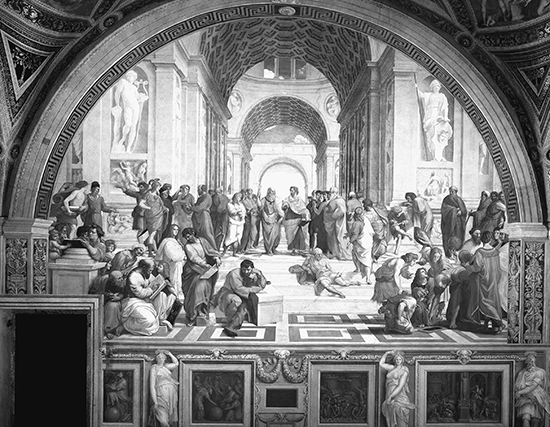
Fig. 1. Schools of Athens. Raphaels evocation of the intellectual vigor, diversity, and discursiveness of Greek science.

Tradition follows Aristotle in identifying the earliest physici as some gentlemen of Miletus, a flourishing Greek city on the coast of Anatolia, and in specifying half a dozen other Greek speakers as their successors. In this philo-Hellenic creation myth, no Greek physicus learned anything of any importance from a barbarian during the 250 years between the times of the eldest Milesian, Thales, and Aristotle. The story that Pythagoras, if he existed, did so partly in Egypt, suggests outside input; and studies of cuneiform texts reveal a natural knowledge among the Babylonians in some ways more advanced than that of the ancient Greeks. Still, the essential criterion that Aristotle used to identify his predecessors was not that they were Greek, but that they had conquered a paralyzing prejudice. Despite robust contrary evidence, they believed that the natural world runs on law-like principles discoverable by the human mind and immune from interruption or cancellation by meddling gods and demons.
Font size:
Interval:
Bookmark:
Similar books «Physics: a Short History from Quintessence to Quarks»
Look at similar books to Physics: a Short History from Quintessence to Quarks. We have selected literature similar in name and meaning in the hope of providing readers with more options to find new, interesting, not yet read works.
Discussion, reviews of the book Physics: a Short History from Quintessence to Quarks and just readers' own opinions. Leave your comments, write what you think about the work, its meaning or the main characters. Specify what exactly you liked and what you didn't like, and why you think so.

